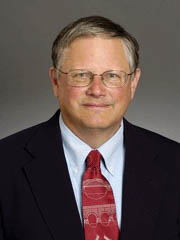
Faculty Feature: Chris Hendrickson
By Prathit Dave
Media InquiriesScott Institute Faculty Affiliate Chris Hendrickson is the faculty director of Traffic21 institute, a transportation research institute at Carnegie Mellon University (CMU). He is also a member of the National Academy of Engineering and Editor-in-chief of the ASCE , Part A: Systems and the Hamerschlag University Professor Emeritus of Civil and Environmental Engineering and Engineering and Public Policy departments at CMU. Hendrickson’s areas of expertise include computer-aided engineering, transportation systems, construction project management and environmental systems.
Hendrickson is currently the faculty director of Traffic21, which fuels the smart transportation sector through groundbreaking research and technological developments. The CMU institute works on research, development and deployment of intelligent transportation systems for the twenty-first century having strong ties with the Pittsburgh region to provide regional and global solutions. Traffic21 was established in 2010 with seed grant from Henry L. Hillman Foundation.
Dr. Hendrickson, in collaboration with Traffic 21 and the Scott Institute, published a policy brief exploring the alternative fuels that can be used with lower tailpipe emissions for the bus fleet of Port Authority of Allegheny County (PAAC), a transit agency of Pittsburgh. PAAC mainly relied on diesel buses and wanted to explore what alternative fuels could be used to run its fleet such as natural gas to battery electric buses (BEBs) in order to curb air pollution locally. The report outlined financial implications for eight alternative fuel technologies for transit buses and based on findings, recommended to use BEBs to reduce their reliance on diesel. As a result of this study, Port Authority bought several BEBs along with required charging stations to make a shift away from conventional fuels like diesel.
Hendrickson has also worked on a comprehensive and interdisciplinary study of methods and approaches to achieve deep decarbonization in the US with The National Academies of Sciences, Engineering, and Medicine. He is a part of the study panel which published a report last year, focusing on federal actions that should be taken to achieve decarbonization of the US energy systems. The report covered the topics of efficiency, and how to achieve net zero emissions of power generation, transportation and industrial sectors. This ongoing study guides the federal and state governments to build policies around deep decarbonization not only from a technological point of view, but also considering social and economic aspects. The final report would also call for action from the private sector and local and state governments to become net zero.
At Carnegie Mellon University, Hendrickson also concentrated on green design, exploring the environmental life cycle consequences of alternative product and process designs. He has contributed software tools and methods for sustainable construction, pollution prevention, and environmental management, including life cycle analysis open-source software and a widely cited analysis of the life cycle consequences of lead-acid battery-powered vehicles.
Hendrickson headed the CEE department from 1996 to 2006. He also worked as a co-director at Green Design Institute of Carnegie Mellon University, which seeks to conduct, foster, and promote research pertaining to infrastructure and systems growth in the developing world. He previously served as Associate Dean for Academic Affairs for the College of Engineering at CMU.
After becoming a professor emeritus, Hendrickson is working mainly as a researcher at Mobility21 university transportation center. His work at Mobility21 focuses on transportation policy and alternative transportation fuels such as battery electric vehicles, hydrogen fuel cells and low carbon liquid fuels as substitutes on conventional fuels used in automobiles.
Last year, Hendrickson was awarded the Richard R. Torrens Award for Editing Service from American Society of Civil Engineers (ASCE). He was also honored with a Lifetime Achievement Award from Council of University Transportation Centers in 2020. Hendrickson has co-authored numerous papers and eight books, including Life Cycle Assessment: Quantitative Approaches for Decisions that Matter (2014), Project Management for Construction and Fundamentals of Infrastructure Management (2018).
—
Chris Hendrickson received his BS and MS degrees from Stanford University in engineering and economics respectively, a M. Philosophy degree in economics from Oxford University, and a Ph.D. from the Massachusetts Institute of Technology in civil engineering. He joined Carnegie Mellon University in 1978 as an assistant professor and has been affiliated with the University ever since. His research, teaching and consulting are in engineering planning and management, including design for the environment, transportation systems, construction project management, finance and computer applications. You can contact him here on his website.